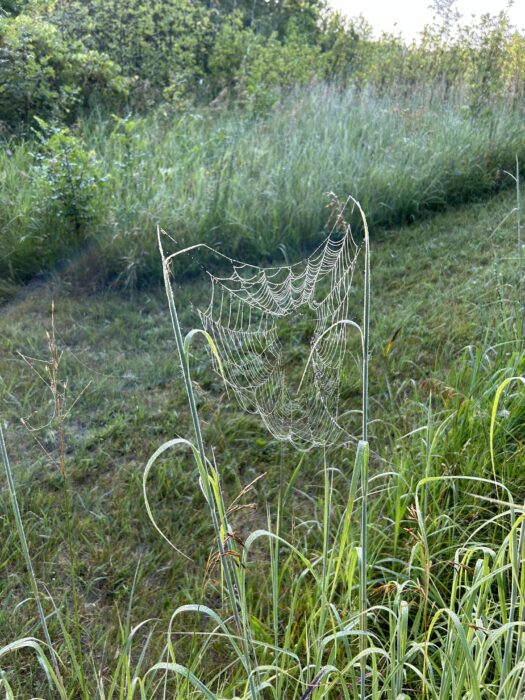Hello, friends — I hope this finds you warm and well in the waning days of summer. Our prompt this month was to write ekphrastic poetry — commonly understood as poetry based on another piece of art. We all shared photos to use as our source material, but beyond that we went forward without boundaries or direction. Yikes, but also yay!
I created my own guardrails by working on a villanelle — increasingly my favorite form because of how insistently and inevitably musical it is. (Not to say I achieved that — just that it is a lovely land to visit…) Meanwhile, you’ll see that, while my poem is writing to and about a spider web, it took a distinctly family turn. The muse does what she does.

The Web Holds
Liz Garton Scanlon
Grandmother’s story hangs threadbare
unwinding with us as we go,
our loose attachments barely there
like spider silk, both art and snare.
A promise made too long ago,
Grandmother’s story hangs threadbare
and were she here, she’d say a prayer
that we’d hold tight to what we know
(our loose attachments barely there,
our grievances as clear as air)
and still, the tempting status quo:
Grandmother’s story hangs, threadbare.
What does it mean to be an heir?
First warp, then weft, then vertigo,
our loose attachments barely there,
it’s hard to say what’s right or fair.
The web is holding, even so…
Grandmother’s story hangs threadbare,
and our attachments are still there.
Enjoy the other poems here:
Tanita
Tricia
Mary Lee
Sara
Laura
Kelly
And here:
Susen Thomsen at Chicken Spaghetti hosts Poetry Friday
See you in September, all!

Ooh. So very lovely. I do believe you achieved the insistent and inevitable musicality.
This stanza, especially, tugged my heart:
“What does it mean to be an heir?
First warp, then weft, then vertigo,
our loose attachments barely there,”
This line is beautiful: “First warp, then weft, then vertigo,” what a wonderful way to feel the weaving.
The last three lines of this poem are such a perfect description of family. I love where your poem went. Thank you for sharing.
The last 3 lines are a perfect description of family. I love what you’ve done with this subject and form. Thank you for sharing.
Oh, Liz.
(our loose attachments barely there,
our grievances as clear as air)
That warp and weft and vertigo made me tear up. Will the circle – the weave – be unbroken?
The web is holding, even so…
What a lovely poem. The lines
“and were she here, she’d say a prayer that we’d hold tight to what we know” remind me of my own grandmother. Thank you for sharing.
This is a topic I’ve often discussed with my brother. I’m older & know more stories than he remembers, but many told to our children, then grandchildren are both fun and nostalgic (for us), but only photo remembrances to those after us. I love your ending, a loving sentiment and conundrum: “it’s hard to say what’s right or fair.
The web is holding, even so…
Grandmother’s story hangs threadbare,
and our attachments are still there.”
Liz, I think a lot of people can relate to the family story you tell here. I so like the change in this line: “our loose attachments barely there,” to “and our attachments are still there.” Beautiful story of family attachments, and I think the spiderweb illustrates your “grandmother’s story hanging threadbare”
Gosh that last line–so beautiful. Gorgeous ekphrastic.
I do find some comfort in guardrails – there’s something about the rules of a form that help me conquor the intimidation of an empty page!
Mmm…musical like an elegy; beautiful and haunting like the silken web.
Oh, wow, this one brought tears to my eyes, Liz. Absolutely gorgeous.
Liz, you created a beautiful flowing poem. These lines brought back to my cfamily thoughts:
Grandmother’s story hangs threadbare
and were she here, she’d say a prayer
that we’d hold tight to what we know